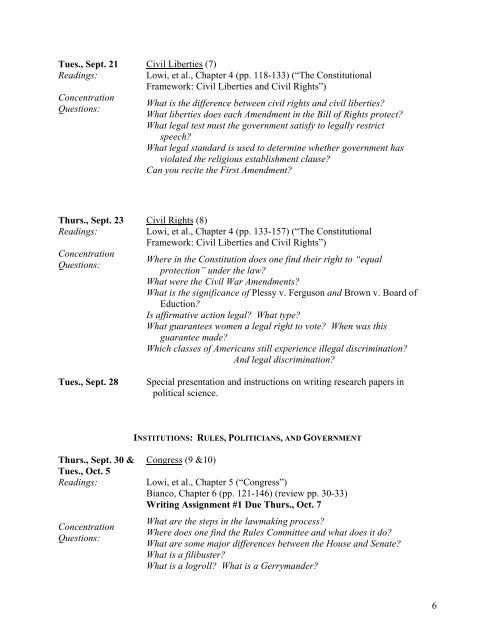Syllabus - Mason academic research system (mason.gmu.edu)
Syllabus - Mason academic research system (mason.gmu.edu) Syllabus - Mason academic research system (mason.gmu.edu)
Tues., Sept. 21 Readings: Concentration Questions: Civil Liberties (7) Lowi, et al., Chapter 4 (pp. 118-133) (“The Constitutional Framework: Civil Liberties and Civil Rights”) What is the difference between civil rights and civil liberties? What liberties does each Amendment in the Bill of Rights protect? What legal test must the government satisfy to legally restrict speech? What legal standard is used to determine whether government has violated the religious establishment clause? Can you recite the First Amendment? Thurs., Sept. 23 Readings: Concentration Questions: Tues., Sept. 28 Civil Rights (8) Lowi, et al., Chapter 4 (pp. 133-157) (“The Constitutional Framework: Civil Liberties and Civil Rights”) Where in the Constitution does one find their right to “equal protection” under the law? What were the Civil War Amendments? What is the significance of Plessy v. Ferguson and Brown v. Board of Eduction? Is affirmative action legal? What type? What guarantees women a legal right to vote? When was this guarantee made? Which classes of Americans still experience illegal discrimination? And legal discrimination? Special presentation and instructions on writing research papers in political science. INSTITUTIONS: RULES, POLITICIANS, AND GOVERNMENT Thurs., Sept. 30 & Tues., Oct. 5 Readings: Concentration Questions: Congress (9 &10) Lowi, et al., Chapter 5 (“Congress”) Bianco, Chapter 6 (pp. 121-146) (review pp. 30-33) Writing Assignment #1 Due Thurs., Oct. 7 What are the steps in the lawmaking process? Where does one find the Rules Committee and what does it do? What are some major differences between the House and Senate? What is a filibuster? What is a logroll? What is a Gerrymander? 6
Thurs., Oct. 7 Readings: Concentration Questions: The Presidency (11) Lowi, et al., Chapter 6 (“The Presidency as an Institution”) What is the difference between being a head of state and a head of government? Under what conditions can the President claim “executive privilege?” What is an “executive order”? A “signing statement”? An “executive agreement?” Does the President make the federal budget? Can the President take the country to war? Thurs., Oct. 14 (Note: Mon., Oct. 11 is Fall Break. Monday classes meet on Tuesday Oct. 12 and our class will not meet on Tuesday of this week). Readings: Concentration Questions: The Bureaucracy (12) Lowi, et al., Chapter 7 (“The Executive Branch”) Bianco, Chapter 7 (pp. 147-173) How many cabinet secretaries are there? In which Department can one find the National Park Service? The Forestry Service? What is the OMB? What is a government corporation? What is an example of one? By what means does Congress oversee the bureaucracy? Who is the Secretary of Defense? Tues., Oct. 19 Thurs., Oct. 21 Readings: Concentration Questions: The Judiciary (13 & 14) Lowi, et al., Chapter 8 (“The Federal Courts”) Bianco, Chapter 8 (pp. 174-189) What is the significance of Marbury v. Madison? What Act of Congress created the federal judiciary system? What are the rules of access a case must satisfy before the Supreme Court will hear it? What is the “rule of four?” What is the majority opinion? By what means do interest groups attempt to influence the Court? Who are the current justices serving on the Supreme Court? Tues., Oct. 26 MIDTERM EXAM PEOPLE AND POLITICS: VOTING, PARTICIPATION, AND GOVERNMENT 7
- Page 1 and 2: AMERICAN POLITICAL PROCESS Universi
- Page 3 and 4: to podcasts where you can listen to
- Page 5: Concentration Questions: Define gov
- Page 9 and 10: Concentration Questions: Review Bia
Tues., Sept. 21<br />
Readings:<br />
Concentration<br />
Questions:<br />
Civil Liberties (7)<br />
Lowi, et al., Chapter 4 (pp. 118-133) (“The Constitutional<br />
Framework: Civil Liberties and Civil Rights”)<br />
What is the difference between civil rights and civil liberties?<br />
What liberties does each Amendment in the Bill of Rights protect?<br />
What legal test must the government satisfy to legally restrict<br />
speech?<br />
What legal standard is used to determine whether government has<br />
violated the religious establishment clause?<br />
Can you recite the First Amendment?<br />
Thurs., Sept. 23<br />
Readings:<br />
Concentration<br />
Questions:<br />
Tues., Sept. 28<br />
Civil Rights (8)<br />
Lowi, et al., Chapter 4 (pp. 133-157) (“The Constitutional<br />
Framework: Civil Liberties and Civil Rights”)<br />
Where in the Constitution does one find their right to “equal<br />
protection” under the law?<br />
What were the Civil War Amendments?<br />
What is the significance of Plessy v. Ferguson and Brown v. Board of<br />
Eduction?<br />
Is affirmative action legal? What type?<br />
What guarantees women a legal right to vote? When was this<br />
guarantee made?<br />
Which classes of Americans still experience illegal discrimination?<br />
And legal discrimination?<br />
Special presentation and instructions on writing <strong>research</strong> papers in<br />
political science.<br />
INSTITUTIONS: RULES, POLITICIANS, AND GOVERNMENT<br />
Thurs., Sept. 30 &<br />
Tues., Oct. 5<br />
Readings:<br />
Concentration<br />
Questions:<br />
Congress (9 &10)<br />
Lowi, et al., Chapter 5 (“Congress”)<br />
Bianco, Chapter 6 (pp. 121-146) (review pp. 30-33)<br />
Writing Assignment #1 Due Thurs., Oct. 7<br />
What are the steps in the lawmaking process?<br />
Where does one find the Rules Committee and what does it do?<br />
What are some major differences between the House and Senate?<br />
What is a filibuster?<br />
What is a logroll? What is a Gerrymander?<br />
6



